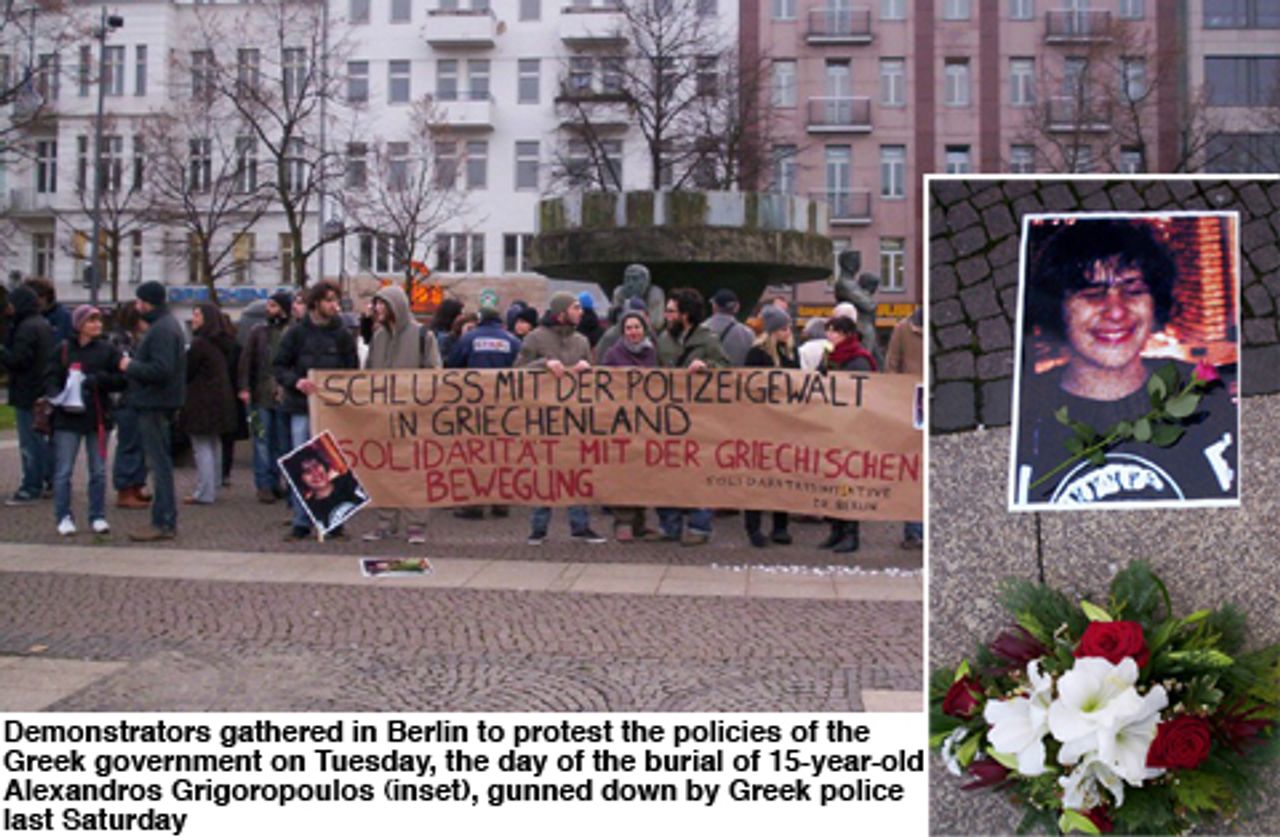
Protests by students and school pupils continued in Greece on Thursday. In Athens, students have occupied the polytechnic; another 15 university buildings have been occupied in the capital city and in Thessaloniki, Greece’s second largest city. According to police estimates, around 100 schools have also been occupied by pupils in both cities.
At the same time, solidarity demonstrations outside Greek embassies have spread across Europe. Clashes between police and groups of protesters took place in Rome, Madrid and Copenhagen on Wednesday evening, with a number of arrests made. Protests have also taken place in Turkey.
The WSWS spoke to demonstrators who had gathered in Berlin on Tuesday—the day of the burial of Alexandros Grigoropoulos, the young man gunned down by Greek police last Saturday. The demonstrators had gathered outside the Greek consulate in Berlin to protest against police violence and the policies of the Karamanlis government.
In a peaceful rally, the demonstrators called upon the German public to express its solidarity with the Greek protests and stressed the significance of the events in Greece for Germany and Europe as a whole.
In a leaflet handed to passers-by, they called for support for a rally to be held in Berlin this Sunday. The leaflet stated: “There are good reasons for the protests in Greece. They are a reaction to the economic crisis, unemployment, the destruction of social gains and precarious living and employment conditions. All of Greece is making a stand.” The leaflet then went on to appeal for international support for the mass movement in Greece.
The WSWS spoke to Nikos, who studied journalism in Athens and now lives in Berlin. He stated that Greece had not seen this level of revolt and popular opposition since 1974. As a consequence, he was sure there was bound to be an increase in popular awareness.
“The killing of a boy from a wealthy family proves that the police have now become a general threat to society, and not just for the poor, immigrants, and the unprivileged,” Nikos said. “The Greek population has to try to grasp what is taking place because it’s not just vandalism by some extremists, but has its roots in doubts and fears for the future—the complete lack of the social and economic means for a reasonable future.”
“Greek society is suffering and has suffered in the past from a bad economic situation, low wages, low pensions, and low unemployment payments. At the same time, rents and the cost of living are continuously rising. The country’s welfare system is also being run down and is having a knock-on effect on the social security system and hospitals.”
Anthoula is a 22-year-old drama student from Athens. She told the WSWS: “The issues at stake in Greece go far beyond that of police brutality. There needs to be a general change of the society. It is the system of capitalism that creates inequality and state terror in many countries, and therefore people have to cooperate internationally to fight for a different political perspective.”
Of particular concern to the students taking part in the Berlin demonstration was a new law that recognises private universities, while at the same time cuts the funding for public universities. The result is the deliberate creation of an elitist education system.
All of those taking part in the demonstration agreed that the death of the teenager last Saturday was merely the spark that made a highly inflammable social situation explode. They expressed their concern that the media and political layers would seek to use the actions of some groups of anarchists to denounce the protests as the action of “extremists.”
A number of protesters also pointed out that police violence is not limited to Greece. Recently, the German newspapers have dealt with the case of two German policemen who were tried (and acquitted) in the murder of a black prisoner in Dessau. At the same time, the social issues which led to tens of thousands of Greeks taking to the streets—the devastating effects of the economic crisis, growing poverty, the dismantling of the welfare state, privatisation and unemployment—were issues affecting every European country and could precipitate similar popular movements.
